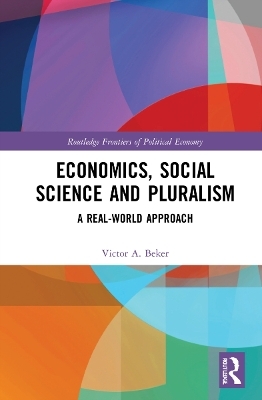
Economics, Social Science and Pluralism
Routledge (Verlag)
978-1-032-21231-9 (ISBN)
In the work of most classical economists – including Smith and Keynes – theory was often embedded in application. But from the second half of the last century on, mainstream economics styled itself as "pure" economics, where the theory is presented in a very abstract form detached from any application. This book maintains that economics is a social science whose mission is to explain and, when possible, predict, phenomena of the real-world economy. The book argues that the first step to restoring economics as a social science is to define what issues economics should address. Only after this research agenda is established should the appropriate methodology be chosen, not the other way around. In this respect, examples from other social sciences as well as from natural sciences are considered more appropriate models for economics rather than physics. Moreover, the need for a closer interaction with psychology, sociology and other social sciences is required to restore the discipline to that field instead of acting as a branch of applied mathematics. The book also argues for a more pluralist approach to economic education to enable prospective economists to understand real-world economic phenomena and potential policy solution. For this reason, a good economics education should necessarily include the study of economic history and of the institutional environment.
This book is essential reading for anyone who wants to see economics return to its origins as a social science.
Victor A. Beker is Professor of Economics at the University of Belgrano and the University of Buenos Aires, both in Argentina. He has been Director of the Economics Department at the University of Belgrano and of the Economics Programme at the University of Buenos Aires, and has been awarded several prizes for his works in economics. A former Associate Editor of the Journal of Economic Behaviour and Organization, he is also author of several economics books and papers.
Acknowledgements, PREFACE, Chapter 1. WHY ECONOMICS WENT ASTRAY, Chapter 2. THE SCIENTIFIC METHOD IN SOCIAL SCIENCES, Chapter 3. WHAT CAN ECONOMICS LEARN FROM OTHER SCIENCES?, Chapter 4. THE METHODOLOGICAL APPROACH IN THE CLASSICS, Chapter 5. MARSHALL AND WALRAS , Chapter 6. THE KEYNESIAN REVOLUTION, Chapter 7. THE COUNTER-REVOLUTION: FROM FRIEDMAN AND LUCAS TO ARROW-DEBREU, Chapter 8. FROM THE REAL BUSINESS CYCLE THEORY TO THE NEW KEYNESIANISM, Chapter 9. ECONOMICS AS A REAL-WORLD SOCIAL SCIENCE, Chapter 10. THE NEED FOR PLURALISM IN ECONOMICS, Chapter 11. NORMATIVE ECONOMICS, Chapter 12. SUMMARY AND CONCLUSIONS, APPENDIX
| Erscheinungsdatum | 15.06.2022 |
|---|---|
| Reihe/Serie | Routledge Frontiers of Political Economy |
| Zusatzinfo | 1 Line drawings, black and white; 1 Illustrations, black and white |
| Verlagsort | London |
| Sprache | englisch |
| Maße | 156 x 234 mm |
| Gewicht | 453 g |
| Themenwelt | Geschichte ► Teilgebiete der Geschichte ► Wirtschaftsgeschichte |
| Wirtschaft ► Allgemeines / Lexika | |
| Wirtschaft ► Volkswirtschaftslehre ► Wirtschaftspolitik | |
| ISBN-10 | 1-032-21231-4 / 1032212314 |
| ISBN-13 | 978-1-032-21231-9 / 9781032212319 |
| Zustand | Neuware |
| Informationen gemäß Produktsicherheitsverordnung (GPSR) | |
| Haben Sie eine Frage zum Produkt? |
aus dem Bereich


